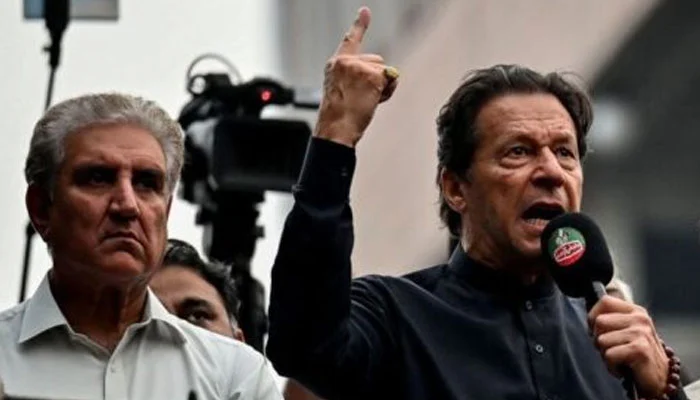ISLAMABAD: A special court, established under the Official Secrets Act 2023, Thursday ordered authorities to present Pakistan Tehreek-e-Insaf (PTI) Chairman Imran Khan and Vice Chairman Shah Mahmood Qureshi at the Federal Judicial Complex (FJC) on November 28.
The orders were issued today in the first hearing of the cipher case that held outside the Adiala prisons after the Islamabad High Court’s (IHC) decision to nullify the August 29 notification for a jail trial.
Judge Abual Hasnat Zulqarnain has been conducting the trial in jail citing security concerns since Khan was indicted on the charges last month. The PTI chairman is currently in Adiala jail after he was indicted by the special court on October 23.
During today’s hearing, the judge asked the court staff to provide him with a copy of the recent IIHC order on jail trial. The judge also told Qureshi’s lawyer Ali Bukhari that the IHC verdict was a big victory for his client.
The IHC on Tuesday nullified the notification for conducting Imran Khan’s jail trial on charges of leaking state secrets.
The ruling came as a division bench comprising Justice Miangul Hassan Aurangzeb and Justice Saman Riffat Imtiaz announced the verdict it reserved earlier in the day on the intra-court appeal filed by the PTI chief against his jail trial.
Allowing Khan’s intra-court appeal, the division bench declared the law ministry’s notification “to be without lawful authority and no legal effect”.
The IHC stated in the three-page short order that the jail trial can be conducted in “exceptional circumstances”.
“In exceptional circumstances and where it is conducive to justice, a trial can be conducted in jail in a manner that fulfills the requirements of an open trial or a trial in camera provided it is in accordance with the procedure provided by law.”
The court also declared that the November 15 notification issued by the Ministry of Law and Justice after the caretaker cabinet’s approval of the jail trial “cannot be given retrospective effect”.
It further stated that all the notifications issued by the ministry with regard to conducting the jail trial are of no legal effect for not adopting due procedure and non-fulfilment of requirements.
Moreover, the IHC also ruled on the designation of the special court judge and declared the appointment legal.
“The designation of the Special Court (Anti-Terrorism-I) Islamabad, to try cases reported under the Official Secrets Act, 1923 through notification (F.No.40(64)/2023-A-VIII) dated 27.06.2023 issued by the Ministry of Law and Justice is valid and lawful,” it read.
On August 29, the Ministry of Law issued a no-objection certificate (NOC) for the jail trial of the former prime minister as requested by the Interior Ministry and special court Judge Abual Hasnat Zulqarnain.
In a hearing on November 14, the high court suspended Khan’s jail trial in the cipher case. This order came after the caretaker federal cabinet approved the jail trial of Khan and Shah Mahmood Qureshi in the case.
Previously, the deposed prime minister — who was ousted from office following a no-confidence motion in April last year — had moved IHC against the jail trial which was rejected by the court’s single bench on October 16.
Later, Khan filed an intra-court appeal against the single bench’s decision.
In August of this year, Khan and Qureshi were booked under the Official Secrets Act 1923 in the cipher case after the Federal Investigation Agency (FIA) invoked Section 5 of the said law.
The diplomatic cable reportedly went missing from Imran’s possession. According to the former ruling party, the cable contained a threat from the United States to topple the PTI’s government.
Ciphergate
The controversy emerged on March 27, 2022, when Khan — less than a month before his ouster in April 2022 — while addressing a public rally waved a letter before the crowd, claiming that it was a cipher from a foreign nation that had conspired with his political rivals to have PTI government overthrown.
He did not reveal the contents of the letter nor did he mention the name of the nation it came from. But a few days later, he accused the United States of conspiring against him and alleged that Assistant Secretary of State for South and Central Asia Affairs Donald Lu had sought his removal.
The cipher was about former Pakistan ambassador to the US Majeed’s meeting with Lu.
The former prime minister, claiming that he was reading contents from the cipher, said that “all will be forgiven for Pakistan if Imran Khan is removed from power”.
Then on March 31, the National Security Committee (NSC) took up the matter and decided to issue a “strong demarche” to the US for its “blatant interference in the internal affairs of Pakistan”.
Later, after his removal, then-prime minister Shehbaz Sharif convened a meeting of the NSC, which came to the conclusion that it had found no evidence of a foreign conspiracy in the cable.
In the two audio leaks that took the internet by storm and shocked the public after these events, the former prime minister, then-federal minister Asad Umar, and then-principle secretary Azam Khan could allegedly be heard discussing the US cipher and how to use it to their advantage.
On September 30, the federal cabinet took notice of the matter and constituted a committee to probe the contents of the audio leaks.
In October, the cabinet gave the green signal to initiate action against the former prime minister and handed over the case to the FIA.



Comments are closed.